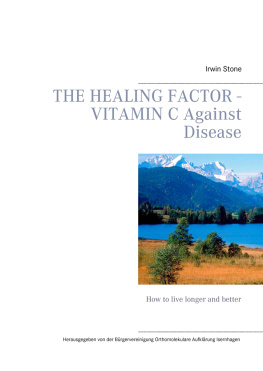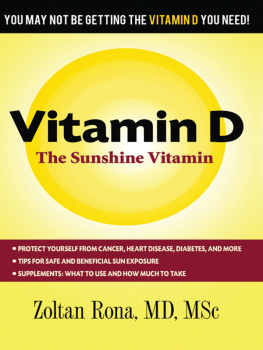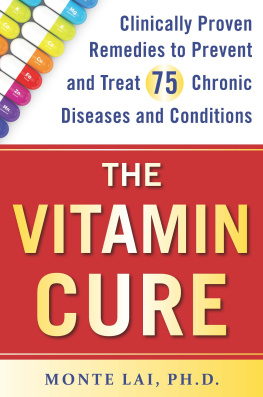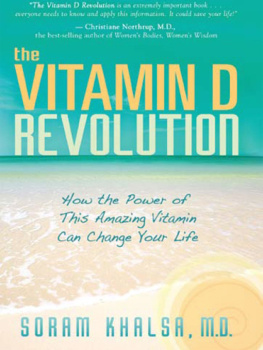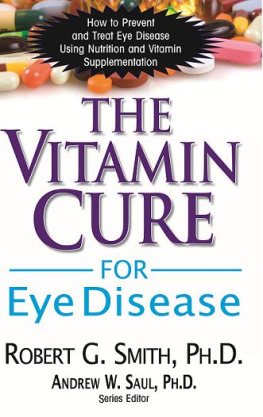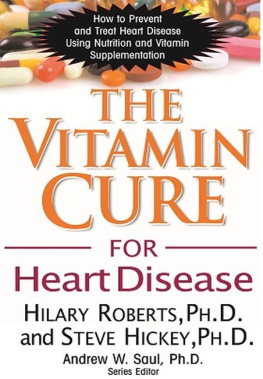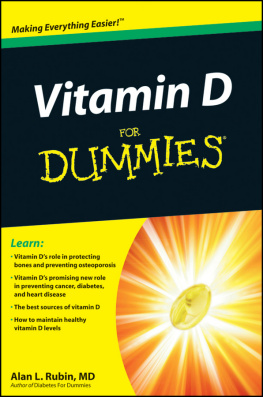Vitamin C may save your life! A noted biochemist reveals for laymen the exciting research into ascorbic acid's powers against such deadly enemies as cancer, heart disease, strokes, mental illness, old age, diabetes, arthritis, kidney disease, hepatitis -- even cigarette smoking!
Kontakt:
Volker H. Schendel
Ministerialrat a. D. - Freier Wissenschaftsjournalist
Kleiststr. 45
D - 30916 Isernhagen
Herstellung und Verlag: BoD-Books on Demand GmbH, Norderstedt
ISBN 9783743150157
AGING - ALLERGIES
ASTHMA - ARTHRITIS - CANCER
COLDS - DIABETES & HYPOGLYCEMIA
EYE TROUBLE - HEART DISEASE - STROKES
KIDNEY & BLADDER AILMENTS - MENTAL ILLNESS
STRESS SYNDROMES - POISONING - POLLUTION
ULCERS - VIRUSES
WOUNDS & FRACTURES
SHOCK
COULD THEY BE
THE RESULT OF VITAMIN C DEFICIENCY?
COULD THEY BE
PREVENTED BY TAKING MORE VITAMIN C?
COULD THEY BE TREATED WITH VITAMIN C?
IS VITAMIN C REALLY A VITAMIN?
IRWIN STONE SAYS YES, YES, YES AND NO!
After 40 years research, Irwin Stone unfolds his startling conclusion that an ancient genetic mutation has left the primate virtually alone among animals in not producing ascorbic acid (Vitamin C) in his own body. By treating it as a "minimum daily requirement" instead of the crucial enzyme it really is, we are living in a state of subclinical scurvy whose symptoms have been attributed to other ailments. The answer is to change our thinking about Vitamin C and consume enough to replenish this long-lost "healing factor." Stone illustrates, with massive documentation, Vitamin C's remarkable ability to fight disease, counteract the ill effects of pollution and prolong healthy life -- easily and inexpensively!
CONTENTS
The numerals set off in parenthesis in the text are intended to guide the reader to the appropriate medical citation listed at the end of the book.
FOREWORD
by Linus Pauling, Ph.D.
Nobel Laureate
This is an important book -- important to laymen, and important to physicians and scientists interested in the health of people.
Irwin Stone deserves much credit for having marshalled the arguments that indicate that most human beings have been receiving amounts of ascorbic acid less than those required to put them in the best of health. It is his contention, and it is supported by much evidence, that most people in the world have a disease involving a deficient intake of ascorbic acid, a disease that he has named hypoascorbemia. This disease seems to be present because of an evolutionary accident that occurred many millions of years ago. Ancestors of human beings (and of their close present-day relatives, other primates) were living in an area where the natural foods available provided very large amounts of ascorbic acid (very large in comparison with the amounts usually ingested now and the amounts usually recommended now by physicians and other authorities on nutrition). A mutation occurred that removed from the mutant the ability to manufacture ascorbic acid within his own body. Circumstances were such that the mutant had an evolutionary advantage over the other members of the population, who were burdened with the machinery for manufacturing additional ascorbic acid. The result was that the part of the population burdened with this machinery gradually died out, leaving the mutants, who depended upon their food for an adequate supply of ascorbic acid.
As man has spread over the earth and increased in number, the supplies of ascorbic acid have decreased. It is possible that most people in the world receive only one or two percent of the amounts of ascorbic acid that would keep them in the best of health. The resulting hypoascorbemia may be responsible for many of the illnesses that plague mankind.
In this book, Irwin Stone summarizes the evidence. The publication of Irwin Stone's papers and of this book may ultimately result in a great improvement in the health of human beings everywhere, and a great decrease in the amount of suffering caused by disease.
- Linus Pauling
FOREWORD
by Albert Szent-Gyorgyi, M.D., Ph.D.
Nobel Laureate
My own interest in ascorbic acid centered around its role in vegetable respiration and defense mechanisms. All the same, I always had the feeling that not enough use was made of it for supporting human health. The reasons were rather complex. The medical profession itself took a very narrow and wrong view. Lack of ascorbic acid caused scurvy, so if there was no scurvy there was no lack of ascorbic acid. Nothing could be clearer than this. The only trouble was that scurvy is not a first symptom of lack but a final collapse, a premortal syndrome, and there is a very wide gap between scurvy and full health. But nobody knows what full health is! This could be found out by wide statistical studies, but there is no organization which could and would arrange such studies. Our society spends billions or trillions on killing and destruction but lacks the relatively modest means demanded to keep its own health and prime interest cared for. Full health, in my opinion, is the condition in which we feel best and show the greatest resistance to disease. This leads us into statistics which demand organization. But there is another, more individual difficulty. If you do not have sufficient vitamins and get a cold, and as a sequence pneumonia, your diagnosis will not be "lack of ascorbic acid" but "pneumonia." So you are waylaid immediately.
I think that mankind owes a serious thanks to Irwin Stone for having kept the problem alive and having called Linus Pauling's attention to it.
On my last visit to Sweden, I was told that the final evidence has been found that ascorbic acid is quite harmless. An insane person had the fixed idea that he needed ascorbic acid so he swallowed incredible amounts of it for a considerable period without ill effects. So, apart from very specific conditions, ascorbic acid cannot hurt you. It does not hurt your pocket either, since it is very cheap. It is used for spraying trees.
I also fully agree with Dr. Pauling's contention that individual needs for vitamin C vary within wide limits. Some may need high doses, others may be able to get along with less, but the trouble is that you do not know to which group you belong. The symptoms of lack may be very different. I remember my correspondence with a teacher in my earlier days who told me that he had an antisocial boy whom he was unable to deal with. He gave him ascorbic acid and the boy became one of his most easygoing, obedient pupils. Nor does wealth and rich food necessarily protect against lack of vitamins. I remember my contact with one of the wealthiest royal families of Europe where the young prince had constant temperature and had poor health. On administering vitamin C, the condition readily cleared up.
It gives me great satisfaction to see this book appear and I hope very much that its message will be understood.
- Albert Szent-Gyorgyi
ACKNOWLEDGMENTS
This book took many years to write and involved many people. Because of a nonexistent budget and the fact that much of the data was in foreign languages, good friends had to be relied upon to supply translations. Among these friends were Lotte and George Bernard, Helene Gottlieb, Dorothy Kramer, Irving Minton, Jutta Nigrin, Sal Scaturo, Tanya Ronger, and Natasha and Otmar Silberstein.
Next page
